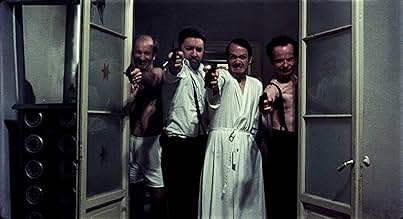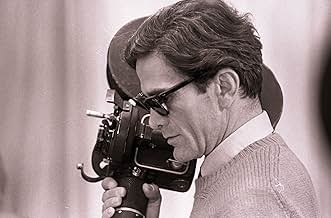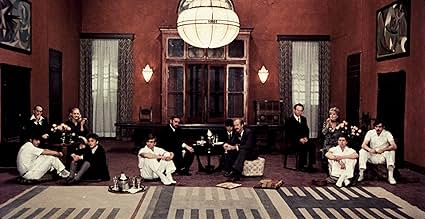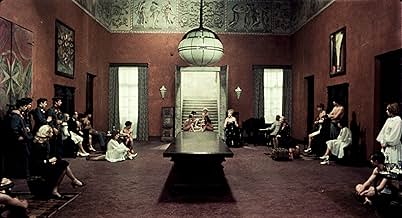
Durante la seconda guerra mondiale in Italia, quattro libertini fascisti raggruppano nove adolescenti e li sottopongono a centoventi giorni di torture.Durante la seconda guerra mondiale in Italia, quattro libertini fascisti raggruppano nove adolescenti e li sottopongono a centoventi giorni di torture.Durante la seconda guerra mondiale in Italia, quattro libertini fascisti raggruppano nove adolescenti e li sottopongono a centoventi giorni di torture.
- Regia
- Sceneggiatura
- Star
- Premi
- 2 vittorie totali
- Eccellenza
- (as Umberto P. Quintavalle)
- Signora Vaccari
- (as Helene Surgere)
Riepilogo
Recensioni in evidenza
*** 1/2 (out of 4)
Nine young boys and nine young girls are gathered up and taken from their homes. They are taken to a secluded castle in Italy during WWII where they hear a variety of perverted stories while their captures sexually and mentally abuse them.
Pier Paolo Pasolini would be murdered before the release of this, his final film and many still seem to think it wasn't a random murder. Many people believe that his politics had some higher ups order his murder but it's doubtful we'll ever know what the truth was. With that said, this final film of his is certainly unlike anything you're ever going to see as it's about as depraved, disgusting and depressing as you're going to get. I personally think SALO, OR THE 120 DAYS OF SODOM is a very good movie but it's hard to really recommend it to anyone.
Based on the work of Marquis de Sade, this film is about as disturbing as everything put to film. The real debate is rather this is some sort of serious art film with a message or is it just a cheap piece of exploitation that was meant to make you sick. I mean, certain horror movies are trashed for their disgusting scenes of violence and sexual brutality but how many movies are actually worse than this one? Not only do you get disgusting stories being told ranging from child rape to people being forced to eat poop but we have to see these things as well. This is a film that really works on the viewers mind so it's going to be up to that viewer whether they take it in as art or some sort of exploitation.
For my money, the film is a piece of art. I'm not going to say what the director was trying to do or say with the picture but to me this film works because it seems very real. It seems like you're really there watching these horrible events and the film really doesn't back down at anything. The stories are rather brutal and we get scenes of such sexual depravity that you can't help but be disturbed. There really isn't any style here because the camera just captures the horrors that are there. The performances are raw, realistic and just add to the horrors of the story.
Obviously, not everyone is going to be able to take this film and I really can't say I'd blame anyone for turning it off. Again, we can debate the politics and message of the film but there's no question that when the end credits start you're going to need a shower.
This is the strongest movie I've ever seen, and it made an IMPORTANT impression on me, a big horrorflick-devotee. It made me question a lot of things about former favourite films, and made me realize how sick it is to make horror and violence into entertainment. The problem with most movies is that violence is not portrayed violent enough, horror isn't portrayed horrible enough. Most 'thriller' films have these ingredients softened so that people can enjoy it, and THAT'S sick. This movie is SANE. It shows horror and violence as it IS - totally revolting and disgusting.
I sat as on needles for 1 hour 40 minutes, and felt really bad watching this film. It grossed me out, but I understood why this film is both good and important. It gives a sane perspective on violence, as opposed to SICK, SICK Hollywood-action where people get killed by 'heroes' and nobody raises an eyebrow.
The film is about a group of rich Fascists during WWII-Nazi Occupied Italy, where they kidnap a group of 18 youngsters, allowing only physically perfect specimins to stay, and subject them to various forms of mental, physical and sexual torture over the next 120 Days. The torture starts off in a sexual nature--Sodomy, rape, humiliation and so on-- and slowly degrades and descends into mental and physical torture. Just when you think what you are seeing can't get worse, it does, ten-fold.
What makes Salo so brutally shocking and disturbing is its uncompromised and blunt way of showing the acts of horror. It is a very quiet and slow film, mostly shot using static and still cameras, it feels more like a documentary than a fictional film. It's clear upon viewing, that Pasolini wanted to remind us all that violence should not be entertainment. As such, every act of violence and degredation is drained of all its possible energy and excitement, and shown in a sad, painful light. Nothing is sugar coated, nothing is softened. This film is an attack on our desensitized feelings towards violence. Yet, at the same time, the film purposely desensitizes us to certain acts -- Such as rape. We see it so much during the film that it becomes "normality" to us, we barely raise an eyebrow. Upon realizing this, one also realizes how the horrible acts shown in the film are possible, and it's a terrible realization.
Salo continues to descend until at the end, when we are taken to the punishing grounds, where various rule breakers are tortured and murdered. This final sequence is the most harrowing and effective I've ever seen in a film. As the victims are tortured and murdered, each one of the fascist rulers take turns as voyer, watching from a second story window, far enough away to not hear the screams of terror and pain. And we watch with him. The film attempts to equate our viewing of this film to their viewing of the executions, after all, we're watching these acts for "entertainment", just as he is. And we distance ourselves from the acts in order to enjoy them, as he does by watching through binoculars far away. It's a savage and truthful attack, one that is impossible to deny.
Also incredibly unsettling is the inherent joy that the villains (Heroes?) feel at their victims pain, sadness and discomfort. Sometimes even to the point of sexual arousal. There is a scene where a girl is crying because her mother died trying to save her from these people. She is completely naked as she weeps, to us, she's the picture of vulnerability and sadness, to the fascists, it's the most exciting thing they've seen all day. The fascists all stand and watch her weep with the utmost sexualexcitement. It is terrifying. It's scenes like these that set Salo apart from other "gross out" movies. Some of the most affecting and frightening scenes are ones where there is quiet, watching the expressions and reactions of people to the various horrible acts.
Salo is a film of rage and sadness. It is a film that asks you to hate humanity, to hate what we're capable of; to look in the mirror and hate yourself. Then weep because nothing can be done about it. Nothing will ever change..
Lo sapevi?
- QuizSalò is a town in northern Italy which Benito Mussolini's Fascist government effectively made their capital from 1943 until they fell from power in 1945.
- BlooperWhen the Duke kisses several victims during Sergio and Renata's wedding, some victims and Ezio begin to laugh, off the character.
- Citazioni
The President: [while eating a meal of feces] Carlo, do this with your fingers.
[the President sticks two fingers in his mouth]
The President: And say, "I can't eat rice with my fingers like this."
Male Victim: [with fingers in his mouth] I can't eat rice.
The President: Then eat shit, you little bastard.
- Curiosità sui creditiEssential Bibliography: Roland Barthes: 'Sade, Fourier, Loyola' (Editions du Seuil); Maurice Blanchot: "Lautréamont et Sade' (Editions de Minuit; in Italy Dedalo Libri); Simone de Beauvoir: 'Faut-il brûler Sade' (Editions Gaimard); Pierre Klossowski: 'Sade mon prochain, le philosophe scélérat' (Editions du Seuil; in Italy SugarCo Edizioni); Philippe Sollers: 'L'écriture et l'experience des limites' (Editions du Seuil)
- Versioni alternativeThe film was rejected for cinema by the BBFC in 1976 and a private showing of the uncut version at the Old Compton Cinema Club in London's Soho resulted in a police raid and confiscation of the movie. A heavily edited version - minus 6 minutes of footage including scenes of torture, homosexuality and excrement eating, and including a 4 minute prologue describing the history of the town of Salo - was later prepared by UK censor James Ferman for club showings. The film was finally passed completely uncut for cinema and video in the UK in December 2000.
- ConnessioniEdited into Histoire(s) du cinéma: Une histoire seule (1989)
- Colonne sonorePrelude in C minor
(uncredited)
Composed by Frédéric Chopin (uncredited)
Played by Arnaldo Graziosi (uncredited)
I più visti
Dettagli
- Data di uscita
- Paesi di origine
- Lingue
- Celebre anche come
- Saló o los 120 días de Sodoma
- Luoghi delle riprese
- Aziende produttrici
- Vedi altri crediti dell’azienda su IMDbPro
Botteghino
- Lordo in tutto il mondo
- 1.810.733 USD
- Tempo di esecuzione
- 1h 57min(117 min)
- Mix di suoni
- Proporzioni
- 1.85 : 1

![Trailer [OV]](https://m.media-amazon.com/images/M/MV5BYTczYWExODUtNmQ3NC00MzRhLTkwMGQtNzRjM2M5ZGQzYmVkXkEyXkFqcGdeQXRyYW5zY29kZS13b3JrZmxvdw@@._V1_QL75_UX500_CR0)





























